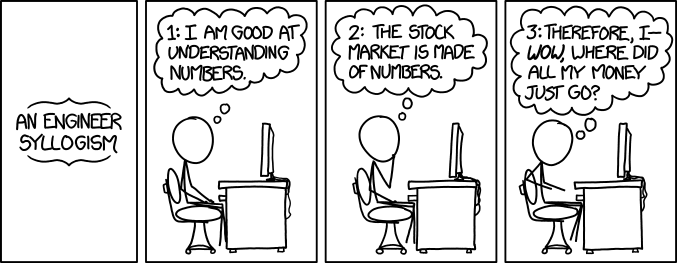|
|
I can't get any work done because I can't keep my mind off this stuff. But first off, you should read the war article. It's great. I'm pretty sure I fall into the Realism camp.
Second, David Hume. I remember agreeing with him about possession so I decided to look him up.
Generally regarded as one of the most important philosophers to write in English, David Hume was also well known in his own time as an historian and essayist. A master stylist in any genre, his major philosophical works—A Treatise of Human Nature (1739–1740), the Enquiries concerning Human Understanding (1748) and concerning the Principles of Morals (1751), as well as his posthumously published Dialogues concerning Natural Religion (1779)—remain widely and deeply influential.
Although Hume's more conservative contemporaries denounced his writings as works of scepticism and atheism, his influence is evident in the moral philosophy and economic writings of his close friend Adam Smith. Kant reported that Hume's work woke him from his “dogmatic slumbers” and Jeremy Bentham remarked that reading Hume “caused the scales to fall” from his eyes. Charles Darwin regarded his work as a central influence on the theory of evolution. The diverse directions in which these writers took what they gleaned from reading him reflect both the richness of their sources and the wide range of his empiricism. Today, philosophers recognize Hume as a thoroughgoing exponent of philosophical naturalism, as a precursor of contemporary cognitive science, and as the inspiration for several of the most significant types of ethical theory developed in contemporary moral philosophy.
GOAT philosopher. Father of modern cognitive sciences (which explains why I don't like economics but do like behavioral economics, because the second incorporates the lessons Hume learned way back in 17xx.)
As the title of the Treatise proclaims, Hume's subject is human nature. He summarizes his project in its subtitle: “an attempt to introduce the experimental method into moral subjects”. In his day, “moral” meant anything concerned with human nature, not just ethics, as he makes clear at the beginning of the first Enquiry, where he defines “moral philosophy” as “the science of human nature” (EHU 1.1/5). Hume's aim is to bring the scientific method to bear on the study of human nature.
Hume's study of philosophical “systems” convinced him that philosophy was in a sorry state and in dire need of reform. When he was only 18 years old, he complains in a letter that anyone familiar with philosophy realizes that it is embroiled in “endless Disputes” (HL 3.2). The ancient philosophers, on whom he had been concentrating, replicated the errors their natural philosophers made. They advanced theories that were “entirely Hypothetical”, depending “more upon Invention than Experience”. He objects that they consulted their imagination in constructing their views about virtue and happiness, “without regarding human Nature, upon which every moral Conclusion must depend”. The youthful Hume resolved to avoid these mistakes in his own work, by making human nature his “principal Study, & the Source from which I would derive every Truth” (HL 3.6).
Hume kills it when he's 18 in the 1700s and the same mistake is still alive and well today.
Even at this early stage, the roots of Hume's mature approach to the reform of philosophy are evident. He was convinced that the only way to improve philosophy was to make the investigation of human nature central—and empirical (HL 3.2). The problem with ancient philosophy was its reliance on hypotheses—claims based on speculation and invention rather than experience and observation.
By the time Hume began to write the Treatise three years later, he had immersed himself in the works of the modern philosophers, but he found them disturbing, not least because they made the same mistakes the ancients did, while professing to avoid them. Why, Hume asks, haven't philosophers been able to make the spectacular progress in understanding human nature that natural philosophers—whom we now call “scientists”—have recently achieved in the physical sciences? His answer is that while scientists have cured themselves of their “passion for hypotheses and systems”, philosophers haven't yet purged themselves of this temptation. Their theories were too speculative, relying on a priori assumptions, and paying too little attention to what human nature is actually like. Instead of helping us understand ourselves, modern philosophers were mired in interminable disputes—evident even to “the rabble without doors”—giving rise to “the common prejudice against metaphysical reasonings of all kinds”, that is, “every kind of argument which is in any way abstruse, and requires some attention to be comprehended” (T xiv.3).
Hume would have loved Libertarians.
To make progress, Hume maintains, we need to “reject every system … however subtle or ingenious, which is not founded on fact and observation”. These systems, covering a wide range of entrenched and influential metaphysical and theological views, purport to have discovered principles that give us a deeper and more certain knowledge of ultimate reality. But Hume argues that in attempting to go beyond anything we can possibly experience, these metaphysical theories try to “penetrate into subjects utterly inaccessible to the understanding” (EHU 1.11/11), which makes their claims to have found the “ultimate principles” of human nature not just false, but unintelligible. These “airy sciences”, as Hume calls them, have only the “air” of science (EHU 1.12/12).
My boy.
Guy studies science, understands it intimately, then turns to philosophers and sees that they're just pulling shit out of their asses. He'd share in all the same criticisms Libertarians can not address because they don't understand the scientific method.
https://www.youtube.com/watch?v=7m1s2NFOGyg#t=12s
|




 Reply With Quote
Reply With Quote













